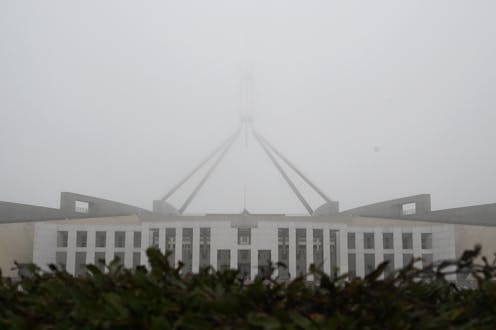Parliament must act to ensure Australia never has 'secret ministers' again
- Written by Luke Beck, Professor of Constitutional Law, Monash University

It was revealed this week that former Prime Minister Scott Morrison was secretly appointed[1] in 2020 and 2021 by Governor-General David Hurley as a minister in the health, finance, treasury, resources and home affairs portfolios.
The cabinet didn’t know, the parliament didn’t know, and the public didn’t know about these appointments. So far, it appears Morrison only exercised his secret ministerial powers in the resources portfolio.
Read more: Scott Morrison made himself treasurer days before the 2021 budget[2]
The situation has been described in various ways, including as “the sort of tin-pot activity that we would ridicule if it was in a non-democratic country” by Prime Minister Anthony Albanese[3]; “sinister” by former Prime Minister Malcolm Turnbull[4]; and “unusual, unorthodox and strange” by former Prime Minister Tony Abbott[5].
It is intolerable for there to be secret ministers. Parliament must act to prevent this ever happening again.
How are ministers appointed?
The Constitution[6] gives the governor-general power to appoint ministers. If you read the text of the Constitution without knowing anything else, you would get the impression the governor-general has broad discretion in appointing ministers.
In practice, that power is limited by unwritten constitutional conventions. One of the most important conventions is that the person who commands the confidence of the House of Representatives should be appointed prime minister. This is usually the leader of the party (or parties in coalition) that has a majority of seats. In turn, the prime minister advises the governor-general on who should be appointed to other ministries.
The governor-general’s power to appoint ministers is also limited by legislation. The Ministers of State Act 1952[7] limits the number of people who can be appointed as ministers. A maximum of 30 people can be appointed as ministers and a maximum of 12 people can be appointed as parliamentary secretaries or assistant ministers.
Ministerial accountability and the role of the governor-general
The Constitution[8] says executive power is exercised by the governor-general. In practice, of course, executive power is really exercised by the prime minister and other ministers. Australia’s Westminster system of government is premised on ministerial accountability to parliament.
Ministerial accountability to parliament can only work effectively if parliament knows who the ministers are and which ministers are responsible for what. A number of politicians and commentators have pointed out that, in secretly appointing himself to several ministries, Morrison misled cabinet and parliament over an extended period of time.
Read more: Word from The Hill: On Scott Morrison's bizarre power grab[9]
No one has been able to point to any past examples of a governor-general appointing secret ministers.
Criticisms are also being made of Hurley’s role in all this. Labor MP Julian Hill said[10],
The governor-general seems to have effectively participated in a scheme that misled the cabinet, the parliament and the public as to the allocation of ministerial power.
A spokesperson for the governor-general released a statement[11] on Monday stating that the appointment of multiple ministers to a single portfolio is not unusual. The statement also claimed it was a matter for the government of the day as to whether and how to publicise ministerial appointments. The first point is true, but the second is more complex.
The governor-general’s statement arguably fails to appreciate the seriousness of the issue. Why did he never mention the secret appointments to other ministers over the years? What steps did Hurley take to prevent Morrison from misleading parliament about the makeup of the ministry?
The governor-general’s statement was issued when we knew of only three of the secret ministries. It failed to mention he had appointed Morrison to other ministries that nobody knew about at the time, leading to the continued misleading of the public.
Ministerial appointments and responsibilities must be published
We can no longer rely on unwritten constitutional conventions to ensure the parliament and the public know who the ministers are and what responsibilities each of them possesses. Constitutional propriety on the part of a governor-general and prime minister can no longer be taken for granted.
Read more: View from The Hill: Morrison's passion for control trashed conventions and accountability[12]
Parliament must reassert its supremacy over the executive, and ensure the exercise of ministerial power is accountable to parliament.
Parliament should amend the Ministers of State Act to require the governor-general to publish in the gazette every appointment of a minister; every change to the portfolios held by a minister; any change to which government department is responsible for an area of policy; and every change to which minister is responsible for a piece of legislation.
Parliament should also amend the act to require ministers to publish in the gazette every authorisation of another minister to act in their stead. Legislation[13] currently allows a minister to authorise another minister to act on their behalf. This is a useful mechanism if a minister goes on leave, for example, but there’s no requirement for these authorisations to be made public.
There should be no secret ministers. The states should also enact similar laws, given that a similar scandal is theoretically possible at the state level too.
We must remain vigilant in ensuring adherence to constitutional norms.
References
- ^ appointed (www.pmc.gov.au)
- ^ Scott Morrison made himself treasurer days before the 2021 budget (theconversation.com)
- ^ Anthony Albanese (www.theguardian.com)
- ^ Malcolm Turnbull (www.abc.net.au)
- ^ Tony Abbott (www.theage.com.au)
- ^ Constitution (classic.austlii.edu.au)
- ^ Ministers of State Act 1952 (classic.austlii.edu.au)
- ^ Constitution (classic.austlii.edu.au)
- ^ Word from The Hill: On Scott Morrison's bizarre power grab (theconversation.com)
- ^ said (www.smh.com.au)
- ^ statement (twitter.com)
- ^ View from The Hill: Morrison's passion for control trashed conventions and accountability (theconversation.com)
- ^ Legislation (classic.austlii.edu.au)













